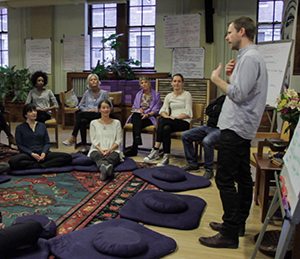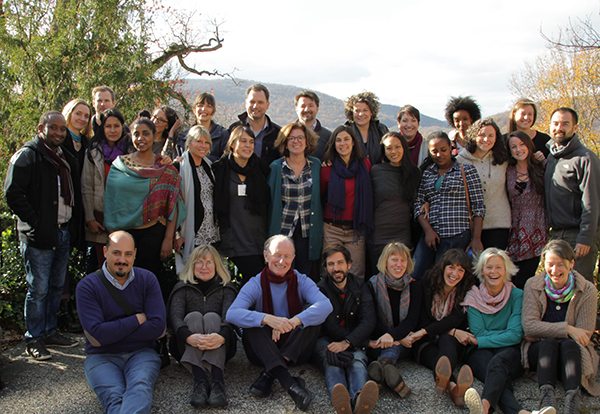Latest CBR Training a Huge Success
In November at the Garrison Institute in New York, the CBR Project held its first training under the leadership of newly-arrived Project Director, Emmett Fitzgerald and Program Associate, Hadley Griffin. Participants responded overwhelmingly with positive feedback, characterizing the training unlike anything they had previously attended. One commented in the feedback process, “I left with a profound sense of connection, calm, and purpose … It was a transformative experience.”
The group attending this training raised the same issues of high stress, inadequate institutional support from aid agencies and a culture of silence around burnout.
For many participants, this training was the first opportunity in a professional setting to openly discuss the mental health consequences of experiences in the field. In aid agency offices across the world, stigma still surrounds the discussion of mental health issues, which can lead those suffering to associate anxiety with weakness, shame and inadequacy in the face of the inherent challenges of aid work. As one participant from a large international agency noted during discussion, “there is simply no room to stand and say ‘I’m overwhelmed and need a break’ during an emergency. And it’s always an emergency.”
A Personal Journey
 Using his personal experience with the specific goal of creating an environment of trust and openness, Emmett opened the training by explaining his personal journey through burnout, anxiety, PTSD, writing for a year and, finally, coming to the CBR Project. This openness set a precedent and led to a remarkable amount of frank sharing from other participants. One participant commented in the anonymous feedback process, “Emmett’s story was powerful and touching, and brought an authentic vulnerability to the group space…I think Emmett and the team accomplished the most important thing: you created a positive, safe space, where people were able to connect.”
Using his personal experience with the specific goal of creating an environment of trust and openness, Emmett opened the training by explaining his personal journey through burnout, anxiety, PTSD, writing for a year and, finally, coming to the CBR Project. This openness set a precedent and led to a remarkable amount of frank sharing from other participants. One participant commented in the anonymous feedback process, “Emmett’s story was powerful and touching, and brought an authentic vulnerability to the group space…I think Emmett and the team accomplished the most important thing: you created a positive, safe space, where people were able to connect.”
The next step in building participants’ comfort levels with discussing their mental health came through the work of the psychologists Maximilien Zimmermann and Ola Witkowska who were able to show from medical research that aid workers’ emotional reactions to chronic and acute stress are not abnormal, but rather are normal physiological and psychological consequences of their work and their environment. Elements of what we call burnout are, Max emphasized, “a normal psychological reaction to an abnormal situation.”
Mindful Movement and Meditation
Having created a safe environment and normalized the way those present had been feeling about their work by discussing some of the common signs of burnout, participants were then guided through how the particular stress they are under can be effectively reduced through mindful movement and meditation.
Guided by professional yoga teacher Chia-Ti Chiu, participants were shown how the physical consequences of stress require a physical outlet to be released. Yoga and other forms of mindful movement are particularly helpful because they require limited space and, as we know, some of the most stressful situations for aid workers coincide with being in security situations which limit movement and therefore make normal exercise routines impossible.
Likewise, one of the great gifts of meditation is that it is always available to us, in spaces large and small, in long moments of quiet, or in short moments on an otherwise out of control day. Faculty member Hugh Byrne led the group in a variety of forms of meditation, introducing over half the group to meditation for the first time.
Both movement and meditation were deliberately used to punctuate the training at regular intervals, particularly after discussions of difficult events and hardship experienced by those present left the group feeling tense as they recalled anxiety from the past. This strategy of intervening at such moments proved successful, as one of the group commented, “Hugh led us through a meditation that completely transformed the room from tension to calm.”
The Benefits
Importantly, this training showed again the extent to which peer to peer support is critical to the program. One participant noted, “this was the first time in ages I’d felt so connected and understood and safe with a group of people I just met. It was such an unexpected and beautiful surprise.”
Another participant wrote, “CBR has literally changed my life, so you should be very proud of where you are and what you are doing. Your work has changed me in a way I was not expecting.”
Reflecting once the training was over, Emmett commented that “running the program for the first time was an intense but amazing experience. I can’t wait to bring the benefits of this program to more aid workers who need support so that they can continue to do their great work in the field.”

Are you planning to offer CBR training in California?